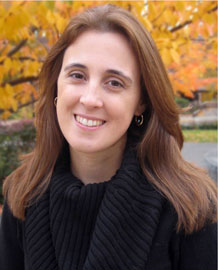

Seminar Challenges Participants to Reach for their Dreams
By Mika Ono
What can you learn about life planning in an hour and a half? Life coach Samantha Sutton of the Handel Group, who gave a workshop at The Scripps Research Institute's La Jolla campus on March 11, thinks you can grasp the fundamentals.
"My goal is to give you the tools to see yourself in a different light and to help you attain your goals," she said to the dozens of Scripps Research participants, some of whom were participating via videoconferencing from Jupiter, Florida. "Designing your life is like designing your ideal body. You have to work at it day after day."
Sutton, who holds a Ph.D. in biological engineering from the Massachusetts Institute of Technology, noted that as human beings, we tend to be quick to take credit for things that go well, and slow to take ownership of thing that are not going well. But, she noted, the Handel Group coaching approach can be summed up by the phrase "You are the author of your own life"—or expressed in a more tongue-in-cheek way, "Maybe it's you."
"That's good news, actually, because if it is you maybe you can change it," said Sutton. "Basically, you either have your dreams or you can have the reasons why [you haven't reached them]. But you have to pick."
According to Sutton, two powerful forces stand in the way of achieving your goals. They can be personified by the characters the Chicken and the Brat, which exist inside your head. The Chicken says things to you like, "What happens if you fail—that would be so embarrassing!" The Brat tells you, "I don't wanna!" Their underlying message is that achieving your dreams would be scary and uncomfortable. Learn to see the flaws in the Chicken's and the Brat's arguments, Sutton urged. Don't let them hold you back.
Sutton went on to encourage participants to dream big, noting that most people aren't particularly good at dreaming due to lack of practice. You can have a dream in many areas of your life, including relationships (with your spouse, coworkers, boss, or family), vocation (career, studies, finances, time), you as an individual (body, health, character traits, home), and personal growth (learning, fun and adventure, spirituality). In formulating your dreams, avoid negative statements, include how you would like to feel, phrase it in the present tense, and have fun with it, Sutton advised.
These dreams do have to be something that you truly believe could happen, though—not, for example, growing a monkey tail.
After you have outlined your dream, ask yourself what steps are necessary for you to get from where you are now to where you want to be. Defining what these steps are is often much easier than actually taking them.
Taking action requires integrity, Sutton said, defining integrity as honoring your promises to yourself.
"Practice integrity and you'll get better at it," she said. "I recommend you make promises to yourself every week."
Sutton gave several examples from her own life of specific, measurable promises she has made. These have included being on time for appointments, running four times per week, spending 10 hours during the coming week writing a paper, not exaggerating, and doing one random nice thing to someone every day. Sutton recommends "giving the promises some teeth," by applying artificial consequences if the promises are not kept. These could include paying five dollars to someone you've kept waiting, contacting the person you've exaggerated to and correcting the facts within 24 hours, or wearing bunny ears if you haven't exercised.
With continuous movement between where you are now, your dreams, and your actions, you can make your dreams come alive.
"Go get 'em!" Sutton concluded.
For more information on Sutton and the Handel Group, see Sutton's blog at http://frameshiftcoaching.wordpress.com or the Handel group's website at www.handelgroup.com. Material from a Handel Group-designed MIT course "How to Live an Extraordinary Life" is also available at http://ocw.mit.edu/OcwWeb/Athletics--Physical-Education-and-Recreation/PE-550Spring-2009/CourseHome/index.htm .
The Scripps Research event, part of the Career Workshop Series, was sponsored by the Kellogg School of Science and Technology, Network for Women in Science, the Society of Fellows, the Office of Philanthropy, and the Office of Career and Postdoctoral Services. If you are interested in watching a video of the seminar or in participating in future Handel Group events at Scripps Research, contact Ryan Wheeler of the Office of Career and Postdoctoral Services at rwheeler@scripps.edu.
Send comments to: mikaono[at]scripps.edu

"You are the author of your own life," says life coach Samantha Sutton.
